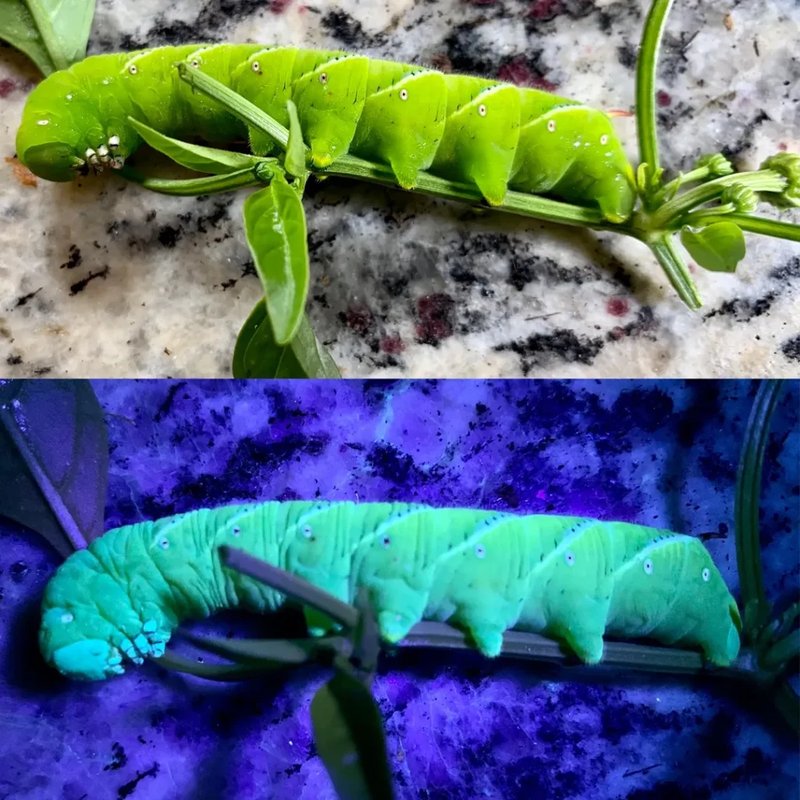
Think of your garden as a miniature ecosystem, and just like how we humans have our own roles to play in society, each creature in your garden has a part to fulfill. Just as we rely on friendships and teamwork, your plants can benefit from the help of these predators. They’re your garden’s little superheroes, swooping in to save the day when hornworms threaten your hard work.
Let’s dive deeper into who these natural allies are, how they work, and how you can encourage them to thrive in your garden.
What Are Hornworms?
Hornworms are the larval stage of a couple of different moth species, notably the tomato hornworm (Manduca quinquemaculata) and the tobacco hornworm (Manduca sexta). They’re big, green, and can grow up to 4 inches long! They’re famous for their voracious appetite, munching on plants and leaving behind ragged leaves, which can be pretty alarming for a gardener.
You might be wondering why these caterpillars have such a bad reputation. Well, it’s not just their size that’s intimidating; it’s the speed at which they can devour your plants. They can strip a plant bare in just a few days. So, understanding hornworms is the first step in managing them effectively.
Fortunately, help is on the way, thanks to some natural predators. These include various insects and birds that have a knack for keeping hornworm populations in check, which we’ll explore more in the following sections.
The Role of Wasps in Hornworm Control
One of the most fascinating natural predators of hornworms are parasitic wasps, like the *Cotesia congregata*. These tiny helpers have a rather unique approach to pest control. They lay their eggs inside hornworms, and when the eggs hatch, the larvae feed on the hornworm from the inside out. It’s nature’s version of a superhero movie—except the hero is a wasp, and the villain is a hungry caterpillar!
What’s almost poetic is that these wasps do not kill their host immediately. Instead, the hornworm gets weakened over time, which often means it won’t be able to munch as voraciously on your plants. If you spot hornworms in your garden, look closely. You might notice some with white, rice-like cocoons on their backs—those are the signs of wasp larvae at work.
To attract these helpful wasps, consider planting flowers that provide nectar. Favorites include dill, yarrow, and fennel. Not only will you enhance your garden’s beauty, but you’ll also invite more beneficial insects.
Birds: The Feathered Friends
Believe it or not, many birds are keen on feasting on hornworms. Birds like sparrows, blue jays, and even wrens are happy to swoop down and snatch up these green pests. In fact, adding a few bird feeders or birdhouses in your garden can create an inviting environment for these beneficial winged creatures.
Birds are also excellent at spotting hornworms from the air. Their keen eyesight makes them efficient hunters. When they realize that your garden is a buffet, they’re likely to return time and again.
To encourage birds to stick around, provide water sources and safe places for them to perch. A simple birdbath can make a world of difference. You might even find that while they munch on hornworms, they also help control other pests, making your garden healthier overall.
Beneficial Insects: Ladybugs and Lacewings
Ladybugs and lacewings are often known for their work against aphids, but they’re also fans of hornworms. While they may not be the first predator that comes to mind, their contribution shouldn’t be overlooked.
Ladybugs munch on hornworm eggs and larvae, effectively reducing the number of caterpillars that make it to adulthood. Lacewings do something similar; the larvae of lacewings are voracious predators that will happily devour various pests, including newly hatched hornworms.
Encouraging these beneficial insects is relatively easy. You can plant nectar-rich flowers like marigolds or cosmos, which attract them. Plus, creating a diverse plant community in your garden helps foster a healthy balance of beneficial insects.
Nematodes: The Under-the-Radar Allies
If you’re into soil health, you’ll want to learn about nematodes—tiny, microscopic roundworms that can be incredibly effective against hornworms. Some species in particular, like *Steinernema carpocapsae*, can infect and kill hornworms.
These little warriors enter the hornworm’s body and release bacteria that cause it to stop eating and eventually die. This means both fewer hornworms and healthier soil for your plants.
While nematodes can sound like a science experiment, applying them is actually quite straightforward. You can usually find them at garden centers or online. Just mix them with water and apply them to your garden beds as directed. Before long, you’ll have an underground army ready to battle those pesky hornworms!
Encouraging a Balanced Ecosystem
Having a lush garden doesn’t just mean planting your favorite vegetables; it’s also about creating a balanced ecosystem that supports various life forms. One huge takeaway here is that nature thrives on diversity.
By planting a mix of flowers, herbs, and vegetables, you can support a variety of insects and birds that work together to control hornworm numbers. Think of your garden as a community where everyone has a role. The more diverse your plant life, the more diverse the critters that will visit.
Moreover, avoid using broad-spectrum pesticides, as these can wipe out beneficial predators alongside the pests. Instead, consider integrated pest management (IPM) strategies that focus on prevention and natural control methods.
Managing hornworms in your garden doesn’t have to be a battle. By understanding and encouraging their natural predators, you’re tapping into a beautiful, complex system that’s been working for millions of years. From wasps and birds to beneficial insects and nematodes, each player has a role that contributes to a thriving ecosystem.
So next time you spot a hornworm, remember there’s a whole team of natural allies eager to help you. By fostering a friendly garden environment, you can enjoy a bountiful harvest while keeping pesky hornworms at bay. Garden smart, and let nature do the heavy lifting!

